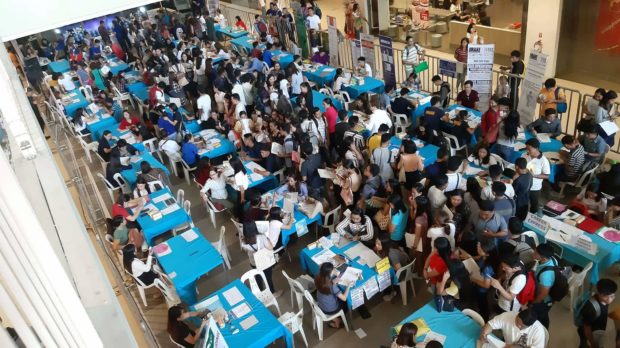
COMING UP: An executive order institutionalizing National Employment Recovery Strategy (NERS) task force. FILE PHOTO by MICHAEL B. JAUCIAN / INQUIRER SOUTHERN LUZON
MANILA, Philippines — President Rodrigo Duterte on Labor Day, May 1, is expected to sign an executive order institutionalizing the National Employment Recovery Strategy (NERS) task force, which is designed to align the government’s overall plan to cope with pandemic-triggered challenges on the labor market.
“We are hopeful that the President will sign an executive order tomorrow institutionalizing the task force that will oversee the implementation of the National Employment Recovery Strategy (NERS),” Director Rolly Francia of the Department of Labor and Employment (DOLE) Information and Publication Service said in a press forum Friday.
“The NERS is an eight-point program. Isa diyang component ay yung wage subsidy, isa yung job summit at marami pang iba,” he added.
(One component is wage subsidy, one is job summit, and many others.)
The NERS’ goal is to “create a policy environment that encourages the generation and improved access to employment, livelihood and training opportunities,” according to a briefer sent to reporters.
Further, the plan intends to “improve employability and productivity of workers and take advantage of the opportunities in the labor market under the new normal” as well as extend support to established and new businesses to preserve and create employment.
“To achieve this, the NERS Task Force (TF) constituted for this purpose will work on initiatives to restart economic activities, restore business confidence, upgrade and retool the workforce, and facilitate labor market access with the end in view of creating employment opportunities and improving the employability of workers,” the briefer read.
The eight measures included under the NERS include:
• the approval of the proposed wage subsidy for private-sector workers
holding of a job summit
• expression of support for the passage of priority legislation and policies that strengthen economic and employment recovery
• promotion of retooling and upskilling of workers
• full implementation of youth employability programs
• assistance to establishments through loans, deferment of applicable fees, upgrading of processes, among others
• social protection to vulnerable groups
• monitoring and support for the continuous implementation of programs with a “high impact on employment”